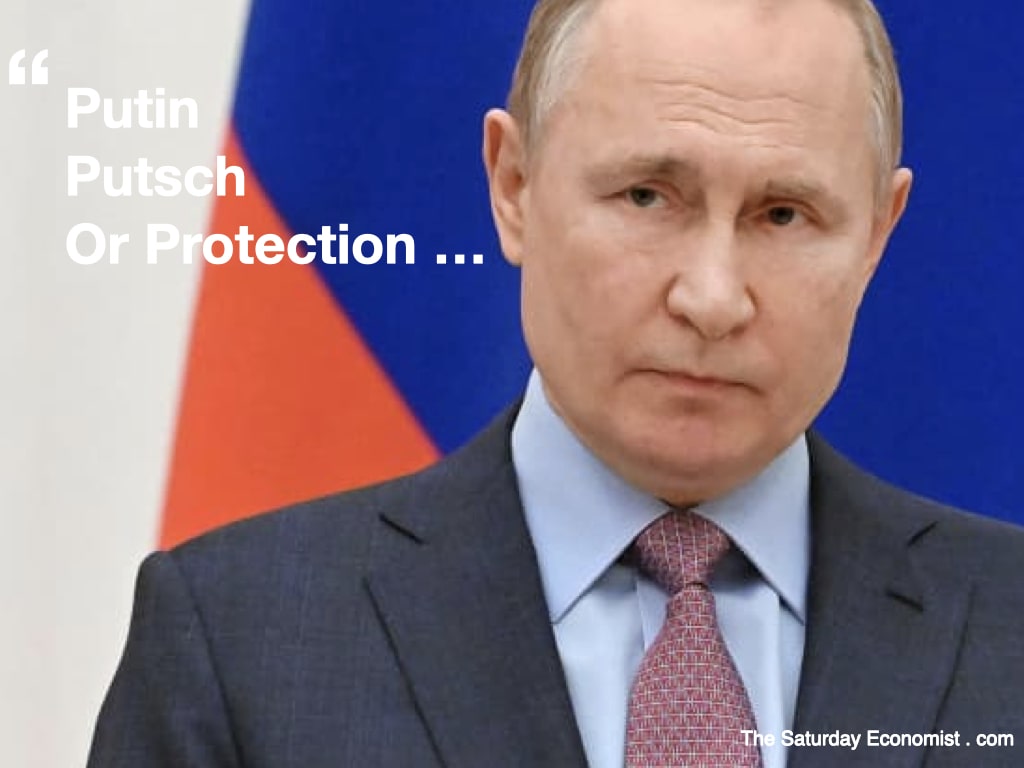|
The Iron Curtain Returns with Gas Leaks ...
"This is a globally systemic event" said Timothy Ash, global strategist at Blue Ray Asset Management this week. Reacting to news of the Russian invasion of Ukraine, he added "Putin is redrawing an iron curtain across Europe." The iron curtain is returning, albeit with gas leaks. Gazprom continues to pump gas through Ukraine into Western Europe. Nord Stream 2 it would appear, is lost as an option for the moment. Putin had begun the big move on Ukraine, with formal recognition of the Eastern provinces of Donetsk and Luhansk. The "People's Republics" would fall under the protection of Putin's Duma. Many believed the advance into Eastern Ukraine would stop or at least stall to await the next stage. It was a strategy that had worked well for Putin. The objective, to create a series of buffer states, in defense of the Motherland. The challenge to bolster defenses against the encroachments of NATO. In the South, in Georgia, Armenia, Azerbaijan and Kazakhstan, Russian troops had been installed as peacekeepers. In the West, in Belarus, President Alexander Lukashenko, invited in Russian troops to support his tottering regime. Now the move on Ukraine to complete the line from Crimea to Kalingrad. No wonder the Baltic states of Latvia, Lithuania and Estonia are upgrading their alert status. The CIA had warned of a large scale invasion. The strategy and battle maps were uploaded to social media. It seemed impossible to think Putin would make the move. As kids we were brought up in the cold war era. We had lived through 1956 and 1968, the repression of freedoms in Hungary and Czechoslovakia. In 1962 we had lived on the edge of the Cuban missile crisis. We were warned to white wash the windows and sit under the staircase in the event of a nuclear strike. It was the MAD age in international diplomacy. The concept of Mutually Assured Destruction was rife in international strategy. One strike and everyone would die. Apart from the ruling elite who would be transferred to a five star underground base, with top line catering facilities. It was an expansionist era ended brutally for the Russian Empire by the 1980 move into Afghanistan.. The "great game" was over. It was an era confined to history or so we thought. Now Putin returns with a 1938 playbook. It didn't end well then, it will not end well now. As with Afghanistan, Ukraine could be a move too far for the Russian state. Sanctions imposed. The Russians will be excluded from the Eurovision Song Contest. More significantly, China is distancing itself from Russia. Foreign Minister Wang Yi said this week ... "China has been following the evolution of the Ukraine issue. The present situation is something China does not want to see". Indeed it is something the world does not want to see. Our thoughts are with the people of Ukraine ... the annexation of sovereign territory unthinkable in the era of peace and globalization ... Economic Impact ... A look at the map to the West, explains the fears of the Russian state to the East. Nation states fear encirclement. NATO additions of the Baltic states together with Romania, Bulgaria and Slovakia are cruel reminders to the Kremlin, of the loss of a Russian empire in a bye gone age. The possible additions of Georgia and Ukraine would put Belarus and Kalingrad at risk. The Putin playbook must sit in that context. It is important for the West to understand the mind set. So what will the economic impact be? Economists are seeking to measure the impact of sanctions and trade tensions with the Russian State. The risks are primarily to growth and inflation. Oxford Economics expect world growth to be impacted by just -0.5% over a three year period. In Russia, the damage to growth is most severe. A growth set back of 3% over three years seems in prospect. In Europe the output loss will be around 1.5%, slightly less in the UK at around 1.3%. The U.S. economy will be largely unaffected. One reason why U.S. markets rallied toward the end of the week. The second impact is on inflation. Food and energy costs the prime movers. Oil prices closed up in the week at $96 dollars per barrel, down from $105 the mid week highs. Gas prices were unchanged over the week. Gazprom keeps on pumping through Ukraine into Germany. The Russians seek to grab the "Breadbasket of Europe". Prices may rise. Let's hope a peaceful end to the conflict appears soon as the price of life continues to rise ...
0 Comments
Leave a Reply. |
The Saturday EconomistAuthorJohn Ashcroft publishes the Saturday Economist. Join the mailing list for updates on the UK and World Economy. Archives
July 2024
Categories
All
|
| The Saturday Economist |
The material is based upon information which we consider to be reliable but we do not represent that it is accurate or complete and it should not be relied upon as such. We accept no liability for errors, or omissions of opinion or fact. In particular, no reliance should be placed on the comments on trends in financial markets. The presentation should not be construed as the giving of investment advice.
|
The Saturday Economist, weekly updates on the UK economy.
Sign Up Now! Stay Up To Date! | Privacy Policy | Terms and Conditions | |

 RSS Feed
RSS Feed